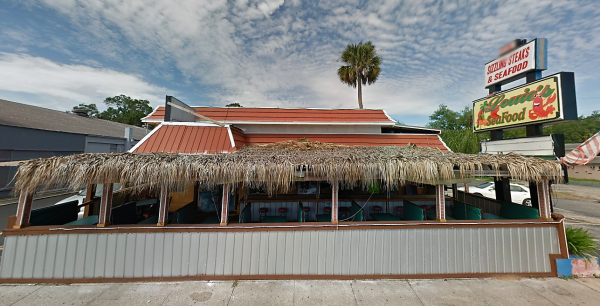An Ocala seafood restaurant has been shut down for the third time this year.
A health inspector ordered Louie’s Seafood Steak & Oyster Bar to temporarily close its doors last week after finding 24 violations – 12 of which were considered to be high or intermediate priority. The restaurant, located at 1900 S Pine Ave., also was temporarily closed March 5 after a dead rat was found in the kitchen and again May 7 when high-priority repeat violations of rodent activity and rodent droppings were found.

Last week’s closure came as the result of a litany of violations, the most egregious of which were labeled high priority and centered around food temperature and roach issues. The inspector issued a stop-sale on soup, feta cheese and cut lettuce after finding potentially hazardous temperature issues inside a walk-in cooler. And an order was given to ice down fish that was kept inside the cooler.
The inspector also issued three high-priority violations for the presence of roaches and other pests. A live roach was found in a cooler behind the bar, near a hand sink in the prep area of the kitchen. Rodent excrement was spotted in several places, including 15 dry hard droppings on the floor around the eatery’s hot water heater. And a small toad was spotted under bricks in the same area.
A final high-priority violation was issued for standing water around the back door near a fence. A server told the inspector that mop buckets get emptied onto the ground near the dumpster, which is causing the issue, a report on file with the Florida Department of Business and Professional Regulation states.
Intermediate violations centered on tags either not marked or prematurely removed from original containers holding clams, mussels and oysters. The restaurant’s menu also failed to identify which food items contain raw or undercooked animal foods covered by a consumer advisory. And the walk-in cooler was “not maintained in good repair,” as the door didn’t fully close and food storage temperatures were deemed unsafe.
The two other intermediate violations cited issues with a three-compartment sink that had been reduced to two bays and the hot water being shut off in the women’s room, thereby eliminating a place for employees to wash their hands, the report says.
The 12 basic violations included:
• A bowl or other container with no handle used to dispense food;
• Build-up of food debris, dust or dirt on nonfood-contact surfaces (exterior of a fan in the kitchen and hood filters over cookline equipment);
• Carbon dioxide/helium tank not adequately secured (tank was kept in the kitchen area);
• Three dead roaches on sticky pads under a bar in the dining room and two on the floor under a reach-in cooler;
• Glasses behind the bar not properly air-dried – wet nesting;
• Floors not constructed to be easily cleanable (areas near walk-in cooler and cookline). Several holes in walls and the ceiling in the bar area and kitchen also were noted;
• Several pairs of in-use tongs stored on an oven door handle between uses;
• An in-use wet wiping cloth/towel used under a cutting board in the prep area;
• A sink with plumbing issues draining onto the ground;
• Water leaking from a pipe near a hand sink at the cookline and from another pipe under a sink near a dish machine;
• A tear in the screen at the back door with “vermin present;” and
• The presence of several non-working pieces of equipment behind the restaurant, unused PVC pipes on the side of building, non-working units in the kitchen area, and personal storage in a carport area that “has a lot of items that could provide harborage for rodents.”
A follow-up inspection the next day revealed seven violations, the most serious of which still centered around food storage temperatures in a walk-in cooler, which was in the defrost cycle.
Another follow-up inspection this past Monday showed similar issues with the walk-in cooler, as well as the same problems with menu descriptions, having no three-compartment sink, non-working equipment in the kitchen area and behind the building, and personal storage in a carport that could provide an area for rodents to congregate.

